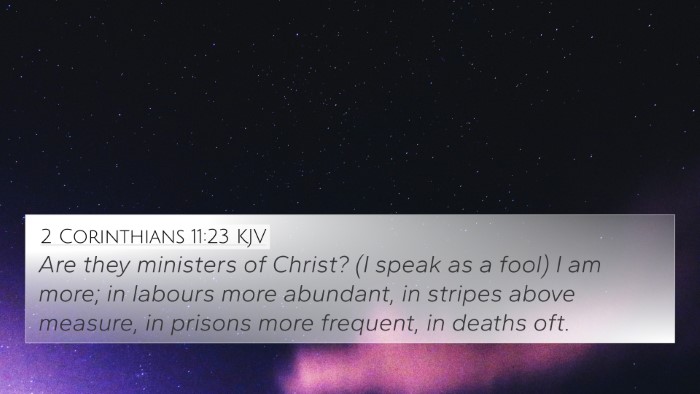Understanding Proverbs 24:16
Proverbs 24:16: "For a just man falleth seven times, and riseth up again: but the wicked shall fall into mischief."
Meaning and Interpretation
Proverbs 24:16 offers profound insight into the nature of righteousness and the resilience of the just, contrasting it with the fate of the wicked. This verse emphasizes that while the righteous may face challenges and setbacks, they possess the strength and determination to rise again, showcasing a theme of perseverance in faith and character.
Insights from Commentaries
Combining perspectives from Matthew Henry, Albert Barnes, and Adam Clarke, we explore the deeper implications of this verse:
- Matthew Henry: He interprets the "just man" as someone who, despite falling—symbolizing failures and hardships—demonstrates resilience. The idea of rising again indicates that true righteousness is not about never failing but about the ability to recover and continue striving for righteousness.
- Albert Barnes: Barnes highlights that the number "seven" symbolically represents completeness in biblical literature, suggesting that the just man may face a full spectrum of trials but ultimately remains steadfast. It serves to reassure readers that struggles are part of life and that divine support enables recovery.
- Adam Clarke: Clarke points out the distinction between the outcomes of the just and the wicked. He notes that while the wicked "shall fall into mischief"—implying a continuous cycle of wrongdoing—they will not experience the growth or restoration that the righteous do after a fall.
Key Themes and Connections
This verse encapsulates several themes worth exploring through Bible verse cross-references. These connections can provide a more complete understanding of the context and implications of Proverbs 24:16.
Cross-References
- Psalm 37:24: "Though he fall, he shall not be utterly cast down: for the LORD upholdeth him with his hand." - A thematic parallel emphasizing God's support for the righteous amid struggles.
- Micah 7:8: "Rejoice not against me, O mine enemy: when I fall, I shall arise; when I sit in darkness, the LORD shall be a light unto me." - Mirroring the assurance of recovery after falling.
- 2 Corinthians 4:9: "Persecuted, but not forsaken; cast down, but not destroyed." - Reinforcing the resilience of believers in facing hardships.
- James 4:10: "Humble yourselves in the sight of the Lord, and he shall lift you up." - Highlighting the importance of humility and faith in rising from downfall.
- Isaiah 40:29: "He giveth power to the faint; and to them that have no might he increaseth strength." - A reminder of God’s providing strength during times of weakness.
- Proverbs 24:15: "Lay not wait, O wicked man, against the dwelling of the righteous; spoil not his resting place." - Further context on the contrasting natures of just and wicked.
- Romans 8:31: "What shall we then say to these things? If God be for us, who can be against us?" - Reiterating that divine support empowers the righteous to overcome difficulties.
- 1 John 1:9: "If we confess our sins, he is faithful and just to forgive us our sins, and to cleanse us from all unrighteousness." - A linking theme surrounding forgiveness and restoration.
- Philippians 4:13: "I can do all things through Christ which strengtheneth me." - The scripture fortifies the idea of divine empowerment in the face of tribulation.
- Proverbs 3:34: "Surely he scorneth the scorners: but he giveth grace unto the lowly." - Acknowledging that God favors the humble, who can still rise despite failures.
Study and Reflection Tools
Understanding Proverbs 24:16 and its implications can benefit from various tools for Bible cross-referencing. Here are some suggestions:
- Bible concordance: Use a concordance to locate every instance of "just," "fall," and "wicked," facilitating deeper study of these concepts.
- Bible cross-reference guide: Refer to guides that highlight similar themes across both Old and New Testaments.
- Cross-reference Bible study: Engaging in a group study focusing on cross-references allows for communal insight and understanding.
- Bible reference resources: Utilizing theological dictionaries can provide a richer contextual background to the verses.
Practical Application
In applying the lessons of Proverbs 24:16, we consider how one can create a roadmap for resilience in their spiritual life. Key steps can include:
- Reflecting on past challenges and the grace that helped overcome them.
- Engaging in regular prayer for strength during difficult times.
- Seeking accountability within a community that encourages righteousness and recovery.
Conclusion
Proverbs 24:16 serves as a powerful reminder of the nature of righteousness and God’s sustaining power in the lives of believers. Through careful comparative Bible verse analysis and exploration of cross-references, one can uncover the rich tapestry of support and encouragement found throughout Scripture. By studying these connections, believers can gain deeper insights into God’s unwavering commitment to uplift those who strive for justice, even after they falter.






















